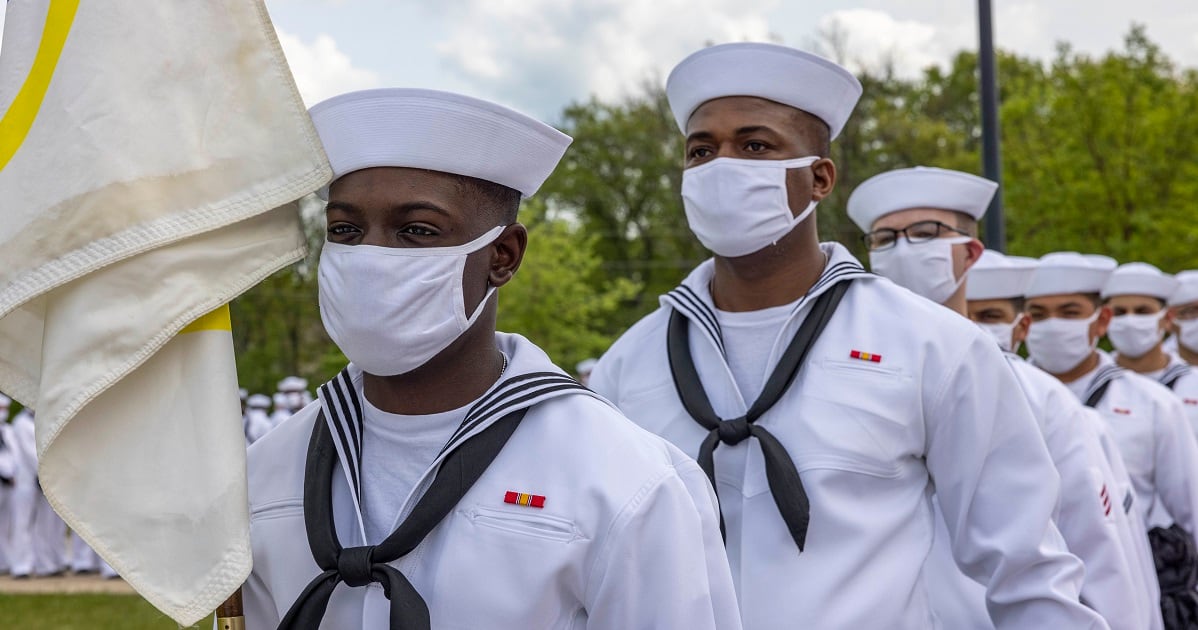As America grapples with a fentanyl crisis, multiple junior sailors have died from the drug aboard the base that houses the Navy’s boot camp in recent years, and investigators have been probing efforts to smuggle drugs onto the installation, including through the U.S. mail system, since at least 2020, according to records obtained by Navy Times.
Two other sailors are facing criminal charges in connection to one of those deaths, records show.
The Navy’s law enforcement agency launched at least five separate investigations into “illicit/controlled substances” being mailed to servicemembers at Naval Station Great Lakes, Illinois, in the second half of 2020 alone, according to Naval Criminal Investigative Service records.
Those substances include fentanyl, cocaine and the opioids hydrocodone and oxycodone, as well as the hallucinogen LSD, Xanax and THC, the psychoactive component in marijuana.
“Numerous service members have been interviewed and related the illicit substances were being sent via the US mail and/or in re-packaged food containers,” according to a December 2020 NCIS investigative summary report.
These incidents and sailor deaths, which the Navy has not publicized and which have not been reported before, raise questions about how young sailors have been able to use and distribute drugs there.
RELATED

Great Lakes contains not only the Navy’s basic training but also schools for newly minted sailors, and records indicate the two sailors who died and the two facing charges had already graduated boot camp.
Navy officials did not answer questions by Navy Times’ deadline regarding how many recruits or sailors at Great Lakes had suffered drug-related deaths since 2020.
They also did not answer a question regarding whether the sea service believes drug smuggling and use aboard Great Lakes to be a larger, systemic problem, nor did they answer questions related to mail screening procedures there.
The Navy also did not answer questions regarding whether any other sailors had been charged in connection to drug use or drug deaths aboard the base.
Meanwhile, as of Monday, NCIS had not provided reams of related records that Navy Times requested nearly a year ago under the Freedom of Information Act.
The service has also refused to release specific data showing how many sailors have suffered fentanyl-related deaths in recent years.
Fentanyl was involved in 174 overdose cases in the military from 2017 to 2021, with fatal fentanyl doses more than doubling during that span, according to Defense Department data released in February.
In civilian America, more than 150 people die each day from overdoses of synthetic opioids like fentanyl, according to the U.S. Centers for Disease Control and Prevention.
RELATED

While the scope of the drug problem at Great Lakes remains unclear, records obtained by Navy Times show that two sailors currently face involuntary manslaughter and negligent homicide charges in the fentanyl-related death of another sailor on the Great Lakes base in late 2021, according to court records.
Officials declined Friday to identify the 21-year-old seaman apprentice who died after ingesting the fentanyl on Nov. 6, 2021, and officials with the Lake County Coroner’s Office outside the base did not reply to a query by Navy Times’ deadline.
“The convening authority determined it was appropriate not to release the full name, rank and rate” of the deceased sailor, Navy spokesman Lt. Andrew Bertucci said Friday. “From our legal team and everything, it’s been out of respect for the privacy of the sailor.”
Seaman Brandon R. Ledesma, 21, and Seaman Recruit Caleb J. Taper, 23, are both charged with negligent homicide and involuntary manslaughter in connection to that sailor’s death, along with a host of other charges.
Their Navy defense attorneys declined to comment for this report.
Bertucci said that Ledesma and Taper were both awaiting orders to attend Naval Submarine School at the time.
Bertucci declined to say whether any other sailors worked with Ledesma and Taper to allegedly distribute drugs on the base.
“We are unable to disclose those names since they would be considered ongoing investigations,” he said.
Ledesma and Taper are accused of giving the seaman apprentice fentanyl and then failing to contact authorities when the sailor collapsed, according to charge sheets.
Both are also charged for moving the sailor’s body to another room in a Great Lakes barracks building known as USS Cole following the collapse.
Ledesma faces an additional involuntary manslaughter charge specification for allegedly telling another sailor not to contact emergency services.
Both sailors are also charged with using, possessing and distributing several illegal drugs aboard Great Lakes, including fentanyl, LSD and cocaine, at various dates from March 2021 to August 2022, according to charge sheets.
Taper is accused of sneaking drugs onto the base inside a Popeye’s chicken box that he got from a person “outside the perimeter” of the base less than a week after the unidentified sailor ingested the fatal fentanyl on Nov. 6, 2021, his charge sheet states.
He faces charges for allegedly breaking restriction on multiple occasions from February to late April, according to his charge sheet.
Taper is also charged for allegedly stealing nearly $160 in video games and “a teeth whitening pen” from the Great Lakes Navy Exchange on Feb. 8, and for fleeing from a Navy police officer that same day, according to his charge sheet.
Ledesma faces his own larceny charges for allegedly stealing more than $500 in video games, clothing and hygiene items from the base’s Navy Exchange store on Feb. 7, charge sheets show.
As of Thursday, Taper was in pre-trial confinement at the Lake County Sheriff’s Office, as the Navy contracts with the jail since there are no military brig facilities in the area, Bertucci said, while Ledesma “is on legal hold at a temporary holding unit” aboard Great Lakes.

Meanwhile, NCIS records show that another junior sailor, Seaman Apprentice Christopher R. Kayser, died a fentanyl-related death in 2020.
The 21-year-old joined the Navy that year and was an avid fisherman who held a black belt in karate and liked to snowboard and surf, according to his obituary.
He was in a preparatory training pipeline for future Basic Underwater Demolition/SEAL training, or BUD/S, at the time of his overdose death in October 2020, according to NCIS records obtained by Navy Times.
Kayser was found unresponsive in his barracks room on Oct. 26, 2020, and his death was later determined to have been due to drug toxicity involving fentanyl and other drugs, according to the NCIS records.
That report states that a fellow sailor “retrieved a package containing contraband for Kayser in order to subvert the screening process.”
What precisely happened remains unclear, as NCIS has not provided the full scope of records requested by Navy Times via Freedom of Information Act records request.
But in an email to Navy Times Friday, NCIS spokesman Jeff Houston said no charges were filed in relation to the agency’s investigation into Kayser’s death.
Navy spokesman Bertucci also declined to provide further details on the sailor’s passing.
Kayser’s family declined comment for this report.
Geoff is the managing editor of Military Times, but he still loves writing stories. He covered Iraq and Afghanistan extensively and was a reporter at the Chicago Tribune. He welcomes any and all kinds of tips at geoffz@militarytimes.com.




